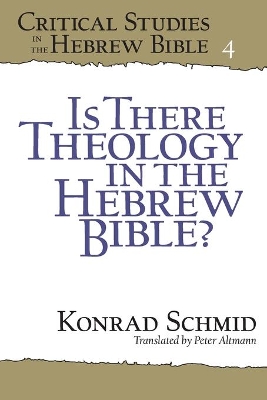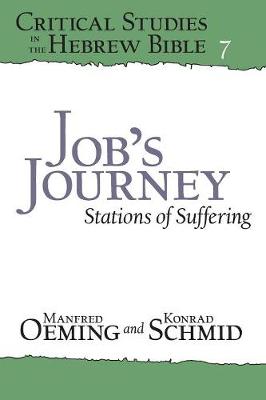Critical Studies in the Hebrew Bible
2 primary works
Book 4
The Hebrew Bible has long been the subject of theological inquiries and debates in Judaism and Christianity. But is there something like theology already in the Hebrew Bible itself? Is it possible to describe the literary growth of the Hebrew Bible by means of an ongoing theological debate? Answers to these questions depend on how one conceives of the category “theology.” In this book, Konrad Schmid reconstructs the development of this category, then describes and discusses biblical texts in the Hebrew Bible that are relevant to the question Is There Theology in the Hebrew Bible?
The book consists of two main sections. In the first, Schmid traces the notion of “theology” from its earliest use, in Greek philosophy, through the medieval period and to today. He pays close attention to “biblical theology,” particularly the different understandings of this idea as something emanating from the Hebrew Bible itself versus something that readers impose onto the biblical text. He also tracks the influence of the discipline of comparative religion on biblical theology, especially with regard to the growing division between biblical and systematic theology. In the second part, Schmid focuses specifically on “implicit” biblical theology, that is, theological reflection apparent within the Hebrew Bible itself. He provides several examples, such as the theologization of the law that resulted from inner-biblical exegesis and Jeremiah’s universal theology of history.
Is There Theology in the Hebrew Bible? will serve as an important reference to all those interested in the question posed by the title. Schmid provides a nuanced answer to this question that both takes into account the convoluted history of biblical theology and lays out new ways of approaching the subject.
Book 7
From the Introduction: "The book of Job does not promote silence about God because we cannot say anything about him. Otherwise, this book would never have been written. But the book of Job does bid farewell to certain types of theology-and we need not bemoan their loss: theology as the wisdom of the world projected into heaven; theology as pious reflection on a higher being that then mistakes traditional or innovative ideas about God entirely for God himself; theology that purports to communicate direct revelation from God. The book of Job distrusts and disbelieves all this to its core. Instead, it states clearly that this is not God; these are only graven images. Such fundamental criticism of all pseudo-theology is-and here we can only agree with the book of Job-not the end but the very beginning of theology."
This book is not an attempt to cover every angle and answer every question that we have about the book of Job. Instead, Konrad Schmid, in the introductory chapter, provides us with an analysis of the structure of the book that helps us to see the book as a whole. And Manfred Oeming, in the chapters that follow, provides clear snapshots of various elements of the book, including a summary of the dialogues, Job's monologue, Elihu's speech ("the Anti-Monologue"), Job's encounter with God, and the destination (of Job's journey). Between them, the two authors provide an accessible scholarly and theological approach to the book that is richly satisfying.

